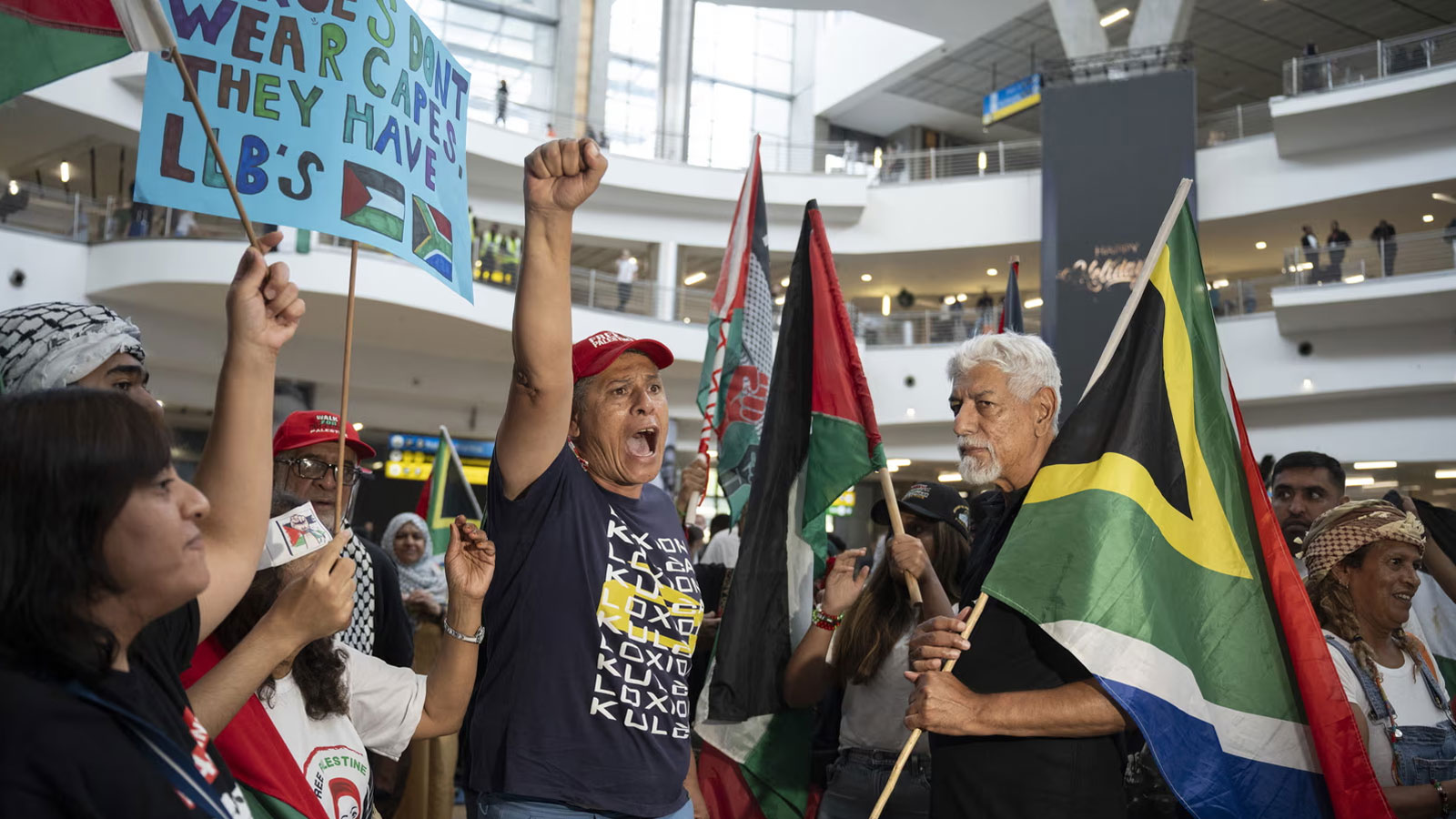Supporters of Palestine have long been told their position is fringe. But this case gives them legitimacy – and tests the limits of human rights.
By Nesrine Malik, The Guardian —
It was only a little over six hours of legal argument, but the genocide case brought by South Africa against Israel at the international court of justice had decades of history bearing down on it. The specifics dealt with Israel’s assault on Gaza, but at its heart, the case was about something wider: closing the gap between Palestinian reality and how the dominant political forces describe it.
For weeks now, anger at events in Gaza has spilled out on to the streets across Europe. Yet this anger has been resolutely ignored, dismissed, banned, or vilified by political leaders. Public support for a ceasefire, now at more than 70% in the UK, is not reflected in the positions of either the government or the opposition. Globally, condemnation of the violence from human rights organisations, the United Nations and even the pope has yet to translate into meaningful action from political leaders.
A UN resolution calling for a ceasefire was blocked by the US. Even the language of protest has been forensically analysed to render it problematic or ignorant; protesters have been accused of “shoehorning” the conflict into “trendy academic theory”, an indulgent modern preoccupation of “leftists and academics”. The foreign secretary, David Cameron, thinks we should not “bandy about” the charge of genocide. All this does is reflect what supporters of Palestine have been told for years: your position is fringe. It isnot based on evidence or morality, but rather on prejudice, radicalismand (more recently)on “wokeness”. In other words, the Israel-Palestine conflict iscomplicated, best left to the grownups.
This position was always premised on the fact that even if support for Palestine was popular, it was not potent. Rarely did it travel from the streets to the halls of power, and when it did, such sentiment could always be blocked or dispersed. In voicing its condemnation of Israel, Ireland, an ex-colony, is one of the few nations to break with the Anglosphere. It has been predictably portrayed as an outlier, a “weak link” in a chain of consensus, and another member of the scruffy ranks who do not have to shoulder the great responsibility that comes with great power.
The submission to the ICJ challenged that portrayal both in appearances and in substance. It matters to hear things that were not taken seriously enough spelled out at a pitch that matches their graveness. It matters that these things, investigated by media outlets, reported by human rights organisations and narrated by Palestinians on the ground, are collected and listed in one address: 6,000 bombs a week in the first three weeks of the conflict; 2,000lb bombs deployed at least 200 times; 85% of Gazans displaced; 93% of the population facing crisis levels of hunger.
It matters that these claims are linked to the Geneva conventions and human rights law. And it matters that they are spoken in a formal setting, within a legal framework, uttered by lawyers and listened to by judges. Even the sober ritual and choreography of the proceedings was a sort of blessing. The overall effect is of an emphatic enfranchisement of the rights of people in Gaza.
In that sense, it matters less what the final ruling is than that the case was made in the first place. You can agree or disagree on whether the legal hurdle for genocide has been met (or whether it even matters, if Israel and its allies will disregard it anyway), but in making a submission that recognises the seriousness of events – and that the seriousness of those events may amount to genocide – enough is presented to clearly illustrate that the international response has fallen shockingly short.
This is not the only challenge to an international order that has made Palestinian claims so difficult to validate. The ICJ case shows how western logic is wearing thin and its persuasive power waning in a multipolar world. The significance of the fact that the country bringing the case is South Africa – an icon of the ravages of colonialism, settlement and apartheid – cannot be lost on anyone. It symbolises a vast racial injustice, too raw and recent to be dismissed as ancient history. In the figure of Nelson Mandela, there lies an evocative example of moral clarity undimmed by persecution. It is no surprise that the support expressed for South Africa is entirely from countries in the global south.
You might be inclined to dismiss the whole thing as a performance. But what exactly is successful political storytelling if not the capturing of imagination and stirring of frustration? There is an experience, woven into such countries’ borders, memories and contemporary politics, of colonial occupations and postcolonial imbalances that render Palestine a totemic cause, one that aligns with resentments towards hegemonic western interests that serve a few and expect the rest to fall in line. Namibia rejected Germany’s support of Israel at the ICJ, referring to Germany’s action in Namibia committing the “first genocide of the 20th century”, one for which it is “yet to fully atone for”.
These experiences are already being expressed. When Russia invaded Ukraine, African countries did not universally condemn the aggression. Anti-European rhetoric has flared up in the wake of coups in former French colonies on the continent. This is not “trendy theory” – it is just an actual trend. The court case is emblematic of a wider confrontation that seems to ask, from within the very same institutions that established it, if this human rights infrastructure is real, or just a theatre to be convened in the service of some international castesystem.
The case will be dismissed, of course, as it already has been, forcefullyby the US, UK, Canada, Germany and others. But there is a cost to dismissing concepts and processes that underpin the very legitimacy of these countries’ claim to moral authority. Crucially, this moral authority is the reason for appointingthemselves the sound custodians of a global foreign policy where the weak are protected and the aggressive arrested. The conflict has put such allies in the position of undermining their own systems or ignoring them, leaching away credibility.
When you are on the wrong side of the UN secretary general, numerous human rights organisations, and objecting to a submission in a global court to which you are a signatory (and in the case of the US and the UK, a court that you established), you are dismantling your house with the very tools that built it. I winced listening to Rishi Sunak justifying airstrikes on the Houthis in Yemen on the grounds of “breaches of international law” and ensuring parties cannot “act with impunity” – the sort of language that appeals and refers to norms that are being blitzed in Gaza. It never sounded more hollow.
“The very reputation of international law hangs in the balance,” said South Africa’s representative in an opening statement in The Hague. But it is Israel and its allies that put that reputation in such jeopardy. In doing so, they have teased out the changing geopolitical winds that have made consent for western political agendas increasingly difficult to secure by force, threat or default. By creating such a focal point for that shift, the case brought by South Africa has illustrated that perhaps it is those who are obstructing attempts to end the severe distress in Gaza who hold the fringe position.
Source: The Guardian
Featured image: Supporters of Tembeka Ngcukaitobi gather at O R Tambo international airport, Johannesburg, to welcome him home after he represented South Africa in the genocide case against Israel at The Hague. (Anadolu/Getty Images)















